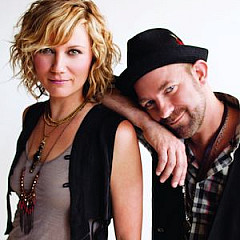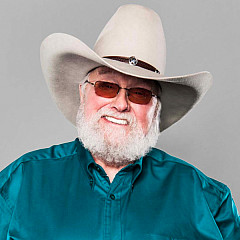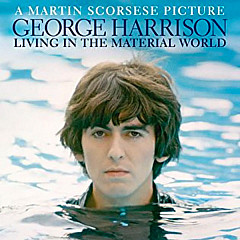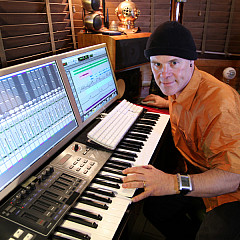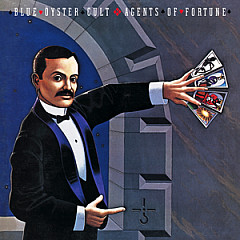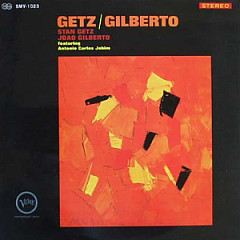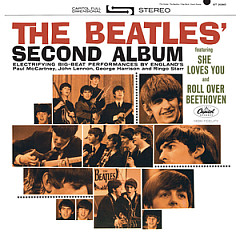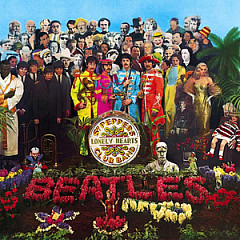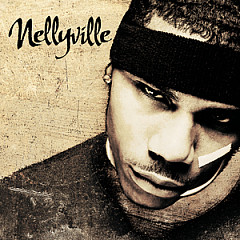 Carl Wiser (Songfacts): Did you ever have to sum up your sound and describe it?
Carl Wiser (Songfacts): Did you ever have to sum up your sound and describe it?Dave Stewart: When I'm working with other people I don't try and enforce my sound on it. I more sort of coax out what we're trying to say. So it's kind of chameleon-like. If I write a song with Mick Jagger, like "The Blind Leading The Blind" or "Old Habits Die Hard," it probably sounds a bit Mick Jagger/Stones-ish. But there's something there that you can't exactly put your finger on, which is obviously me. So I wouldn't say I'm a person that comes and plunks a sound. I can tell you some basic elements that I seem to excel at, which is having a melancholy kind of atmosphere; very strong melodies; and coaxing personal stories rather than a sort of general statement kind of song.
Songfacts: You're certainly good at working with other talented people. It seems like you get them out of their comfort zones in order to draw this out of them. Is there anything else you do to pull these things out of people?
Stewart: I think it's my nature, and how people react to the way I am. Usually a lot of barriers are broken down very quickly, and it becomes, "what's this all really about?"
Don't Come Around Here No More - Tom Petty & the Heartbreakers
Here Comes The Rain Again - Eurythmics
Lily Was Here - David Stewart featuring Candy Dulfer
Sweet Dreams (Are Made Of This) - Eurythmics
Underneath It All - No Doubt
A Good Heart - Feargal Sharkey
Love Is A Stranger - Eurythmics
There Must Be An Angel (Playin' With My Heart) - Eurythmics
Who's That Girl - Eurythmics
Taking Chances - Celine Dion
Liverpool 08 - Ringo Starr
Ordinary Miracle - Sarah McLachlan
I'm Still Breathing - Katy Perry
American Prayer - U2
Would I Lie to You? - Eurythmics
Old Habits Die Hard - Mick Jagger
Stewart: Well, if you go to Katy Perry's new album, the one really sad and melancholy song on it is "I'm Still Breathing." It's talking about a relationship, but it's putting it into a strange context. It has lines like, "I'm still breathing, but we've been dead for a while." You know, "I think we're losing grip, let's abandon ship," and all that kind of funny imagery mixed together.
And then one in the book, "Jealous," with Sinead O'Connor, even Jon Bon Jovi singing "Midnight In Chelsea," when it starts off the lyrics are describing an old couple that have kind of lost it, and it's describing all the things from the basement, looking up and seeing all these people wandering around in Chelsea. And "Here Comes The Rain Again" is kind of a perfect one where it has a mixture of things, because I'm playing a b-minor, but then I change it to put a b-natural in it, and so it kind of feels like that minor is suspended, or major. So it's kind of a weird course. And of course that starts the whole song, and the whole song was about that undecided thing, like here comes depression, or here comes that downward spiral. But then it goes, "so talk to me like lovers do."
It's the wandering in and out of melancholy, a dark beauty that sort of is like the rose that's when it's darkest unfolding and bloodred just before the garden, dies. And capturing that in kind of oblique statements and sentiments.
Songfacts: You pulled "talk to me like lovers do" for "Taking Chances" then, didn't you?
Stewart: Yeah, because "Taking Chances" is the same, me writing with Kara DioGuardi and deciding to enter into something together. So "I don't know much about your life, don't know much about your world, but I don't want to be alone tonight on this planet they call Earth, right? So what do you say of taking chances?" And it builds up and builds up and gets more determined, which is Kara's personality, who's been through a lot, and she goes, you know, "I've been beaten down" and all this kind of stuff. And then it flips into, "So talk to me, talk to me like lovers do." It's like pulling itself out of that, getting the strength, and actually nodding and tipping my hat to one of my own songs within the song.
Songfacts: What do you think Kara's going to be like on American Idol? (this interview took place shortly after she was announced as a judge on the show)
Stewart: Well, she was just 'round my house on Sunday, and we were talking about it. I think it's gonna be good, because Kara has always been dealing with artists who are just starting out, or young artists. But she's also had the experience of writing with Carlos Santana, or myself, or more mature artists who have been through a lot. But she can suddenly flip to a brand new 16-year-old. And she's an amazing singer, for a start, so she can tell straightaway if somebody's got it. And she's brilliant at song structure and arrangement and all that stuff. And she's very outspoken - she says what she thinks, what she means, and there's no messing about.
Songfacts: You mentioned how you're very strong with melodies. Can you describe how those come about?
Stewart: I've no idea. They just come out of my guitar or my mouth, the sound of a certain chord pattern or bass line. I always come with the melody that's outside the counterpoint. So where they would normally come in singing on the one, I do a drop beat. So the song lyric actually starts one beat later than they thought. Or I sing across a rhythm, but it's never like me sitting trying to work out a melody on a piano or anything. It's just the first thing that comes out of my mouth. So everybody is usually sitting around with all sorts of tape recorders and voice mailboxes trying to capture the first thing. And then the scramble is always like, "Did you get that?" And then trying to play it back and decipher it.
 Songfacts: You've written with a whole bunch of people. Has there ever been somebody who has been completely different from what you expected?
Songfacts: You've written with a whole bunch of people. Has there ever been somebody who has been completely different from what you expected?Stewart: Let met think, that's a good question. Lou Reed. Lou Reed was surrounded in this heavy kind of darkness feeling. I'd read about what he'd been through in his life, nearly dying on heroin and all sorts of things, and then when I met him, he was one of the most positive people I ever met. He's just always open to chat about experimenting, and playing guitars together, and doing tai chi and meditating.
Songfacts: (laughs) Lou Reed is very zen.
Stewart: He is.
Songfacts: Who knew?
Stewart: And writing with Bono was an interesting experience. I've been around U2 writing in the studios, and being with them on holidays and things, but then when it's just me and Bono in the room, it's different.
Most great singers do this channeling thing where as soon as they start getting an idea you see one hand go up in the air, as if they're channeling something in. Well, Bono has that times 100. Like, each time he might sing a different melody.
Mick Jagger's similar, too. And then the whole thing is picking which is the great one. How do you edit it? And I think, all U2 albums are made in this way where they have so many takes for so much stuff, and it's editing it down and honing it into the one that really is the master. So if you don't have enough tape left it's a nightmare, because he carries on singing. And you're going, "Hang on a minute, I haven't got any more room on my hard drive," because usually it's in a hotel room or a bedroom or a bench or somewhere, and he's carrying on singing, there's no stopping - he's off. I've got great film of him in the studio where he's singing away, and the engineer's trying to tell him, "We haven't recorded this," and he's just going on and on and on. And then at the end, he goes, "Did you get it?" He'll be, "No, I've been trying to tell you for 15 minutes." It was just interesting to see that flowing through him, and it's unstoppable.
Songfacts: Well, sometimes you get the idea that when you're dealing with a famous lead singer, the singer is just writing lyrics, that's all they do. But it sounds like many times the people you're working with are incredibly musical as well.
Stewart: Oh God yeah. Even if they don't play an instrument, even if they can't pick up a guitar and play it, they're incredibly musical. And they have ideas of where the change should be, or what kind of chord it should be. And the melodies, they've got 100 ideas for melodies. I don't think I've ever written with anyone of note that hasn't had tons of musical ideas as well as words.
Songfacts: You have been on the edge of technology in your time. Do you have any thoughts on the future of songwriting, and of music in general?
Stewart: Well, there's all sorts of software around, software that claims it can detect a hit by taking all the parameters of the chord changes, the melody and the lyric, and then analyzing it against 25,000 other masterpieces. And there's all sorts of people saying, we can write songs remotely using all this technology. And all of it's true, you can. But then there's something that happens when two people get in the room and the door's locked and they're on their own. And there's a piano or a guitar, and a blank piece of paper. Another element comes in. If you take a radio graphic or photo of the room you'd probably see it in some kind of rays coming off each other. And so I think that's never going to change.
But there are going to be great tracks written and recorded by somebody in China, somebody in America talking in iChat or iVideo and via e-mail, and coming up with a great idea, and sending lyrics to each other and melody sketches. That's all happening. And as technology advances and you just touch a screen, and the person appears looking crystal clear and talking to you and crying and telling you what's just happened and how they feel, and then the light comes in and the song starts. I can imagine it would get closer and closer to that thing of two people being in a room.
Songfacts: Can you tell me the difference between working with somebody like Annie Lennox, who you're very intimate with, versus when you just come in to meet Gwen Stefani for the first time and you have to write?
Stewart: Well, it's kind of weird. Because if I walk into a room to write with Gwen, as you pointed out, Gwen comes with a lot of stuff attached to her, and I also come into a room with that. So the first 15 minutes usually is getting past that stuff. And then very quickly, and usually due to a certain courtship, you know like how a certain chord can change the temperature in a room? It evokes a certain emotion in me or in Gwen, and then it'll suddenly make us think about something that happened in her life, and something that she might want to talk about, something she might not want to talk about, but you can kind of hear what it is in the lyric and the melody. And soon, within an hour and a half it's as if you've known that person for years. And often, then, people start talking about all their private thoughts, and everything that's going on in their life usually comes rolling out.
Songfacts: Wow, so it starts when you start playing the music.
Stewart: Yeah.
Songfacts: Interesting. If you're interviewing a football player, you have to give him a football. Otherwise he won't talk, and he won't open up to you.
Stewart: Yeah, it's a bit like that.
Songfacts: Do you see any kind of collaboration on the user end when it comes to music or songwriting? Any kind of feedback?
Stewart: Yeah. I'm involved with a project that's really great, actually, and that could help people enjoy songs in a new way. I go downstairs and there's my 6-year-old playing the drums, my 8-year-old singing, and my 17-year-old and 20-year-old all playing along. And the 8-year-old's singing "Psycho Killer" by Talking Heads, and she's looking for other Talking Heads songs. It's interesting about that immediate interactivity - now they obsess with "Pump It Up" by Elvis Costello, and they want to hear another Elvis Costello one because they really like his voice. They have no idea who he is, but they want to find out. I think anything that brings that discovery is great in a world where we're bombarded with so much information and so many choices. People enjoy the act of discovery. Like when you would go to a record store trying to find this Bob Dylan album, and by the time you get it, you're like, Wow.
So, in Rock Band, for instance, you work out how to play the song, even on the beginner's level. And as you work it out, you're kind of discovering the song. Like, Oh my God, I didn't know the bass line was like that. Because you listen to it, and focus in on it, and Oh, the guitar riff is doing this.
In Finland they have these air guitar competitions. This Japanese guy won in 2007, and he's really amazing to watch. He starts off checking his amp and everything, then he knows every single thing about that guitar riff. You kind of forget he hasn't got a guitar in his hand. And he's playing for 2,000 people going mad.
It's going to be very easy to get on your cell phone, and it's discovery. So you get a song and you go, Yeah, I quite like this song. Then you start hearing all the bits. And you go, Oh my God, listen to the bass and drum. And then you can solo a certain section, and go, Well I think I'll go and save that bit. And then you hear the vocals and the lyrics.
Re-mixing is really great fun, and DJs have had clubs going bonkers for years by chopping up songs and re-mixing them and creating mash-ups. And people like to join in and do it. I read in the New York Times about Girl Talk - Greg Gillis - who chops up massive rock choruses on top of huge sort of hip-hop beats. He has a mad party going on and drives the audience into a frenzy by his sheer enthusiasm by being a fan. And they all feel like they're part of it. So people get on stage with him, and they dance, then they all do certain things at certain times. Like a football match when they all do the wave. People have always liked joining in, and the technology's almost at the breaking point where to join in you don't have to be a mad sort of nerd, technology freak.
But people will only turn up to see you if you're great at doing it, and a great performer. You think, what is a great DJ? And you go to a place where there is one, and you say, Oh, I see, I get it, he's in tune with the audience. Also some of them are just great performers. They've got it down like it's almost a conceptual art piece.
November 20, 2008
The Dave Stewart Songbook is available now
More Songwriter Interviews

